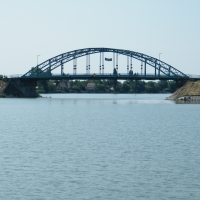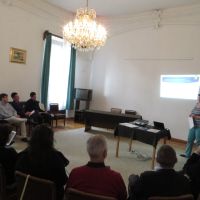2nd seminar on cross-border territorial observation
Border studies + Knowledge sharing | 01 October 2014
Border studies + Knowledge sharing | 01 October 2014
On 30th September, 2014 the 2nd seminar on Cross-Border Territorial Observation was held at the conference hall of the French Institute of Budapest. The seminar, organized by Central European Service for Cross-Border Initatives (CESCI) in cooperation with the Mission Opérationnelle Transfrontalière (MOT) and the France-Hungary Initiatives Association (INFH) and with the support of Hungarian Ministry of Public Administration and Justice has followed the former one held in Nancy in 2012 and is built on the results thereof.
Attendees were welcomed by Hervé Ferrage, Councillor of cooperation and culture and director of French Institute of Budapest, Levente Magyar, deputy state secretary for economic diplomacy of the Hungarian Ministry of Foreign Affairs and Trade, Olivier Denert, secretary general of MOT and Martín Guillermo Ramírez, secretary general of the Association of Border Regions. During the first panel, speakers presented the difficulties and problems the lack of proper comparable data and permanent territorial observation brings on. James Scott, professor of Regional and Border Studies, Karelian Institute at the University of Eastern Finland, executive secretary of Association of Borderlands Studies spoke in the name of scientific researchers, while Gilles Toutin, co-worker of Territorial Strategies Department of the General Commission for territorial equality (CGET-Commissariat général à l’égalité des territoires) in France presented problems arising during territorial observation. Mátyás Jaschitz, director of planning of Central European Service for Cross-Border Initiatives introduced the spatial planning aspect, while Ieva Kalnina, developer and trainer of INTERACT Vyborg has spoken about the data acquisition process during the evaluation of EGTC programmes and the problems arising meanwhile. Speakers pointed out relevant problems concerning the topic, and unianimously highlighted the importance of cross-border cooperation.
In the second panel the speakers presented several best practice models of cross-border territorial observation and data processing. Speakers’ objective was to show the direction that should be followed in Europe with a view to achieving the goals of the Nancy initiative. Nuño Almeida, Portuguese coordinator of the Working-Community Norte de Portugal-Castilla y León and of the Working-Community Norte de Portugal-Galicia presented The statistic atlas of Galicia and Norte de Portugal, then Daniel Svärd, project manager and head of unit of Skåne Region talked about The Örestat model realized in the border region between Sweden and Denmark. Manuela Studer, project manager of Canton of Basel-City and Peter Mowitz, Project Manager of the German State of Rheinland-Pfalz represented the SIGOR-GISOR model realized within a French-German-Swiss cooperation. Finally, Ralf P. Meyer, project manager of the Regional development agency for the Technology Region Aachen introduced the project titled The Locator: Boundless information for enterprises of German-Dutch-Belgian cooperation.
The closing panel aimed at defining the role of the European institutions in developing the framework for successful territorial observation along the borders. Olivier Denert, secretary general of Mission Opérationnelle Transfrontalière presented a system created by the Main Committee for Territorial Equality in France in partnership with the neighbouring countries as part of the Nancy initiative. While the Nancy seminar has made the first steps, the Budapest seminar would spread to Central and Eastern Europe. The progress is expected to continue during the Italian and Luxembourg presidency. In light of this, Jean-Claude Sinner, First Class Councellor of the Government of The Grand Duchy of Luxemburg outlined the relevant aims and plans of the Luxembourg presidency. Finally, Nathalie Verschelde, Deputy Head of Unit at the DG Regio European Cross-Border Cooperation Unit expressed her reactions on what had been said, and outlined the mission of the European Commission. In her speech, she emphasised the role of territorial observation in European cross-border cooperation.
In the end of the seminar, Gyula Ocskay has expressed acknowledgements to all participants.
The presentations of the seminar and further detailed information are avilable on the conference website.
The Nancy seminar (2012)
The Mission Opérationnelle Transfrontalière (MOT), the DATAR (Interministerial delegation for spatial planning and regional attractiveness) and the FNAU (National Federation of Agencies of Urbanism) organised a seminar on cross-border territorial observation in 2012 in Nancy (France). The seminar was successful, the represented countries (France, Germany, Belgium, Luxemburg, Italy) agreed on set up of a working committee responsible for the harmonisation of data compiled in border regions.
Why territorial observation matters?
Territorial cohesion of the European Union as well as the development of Single Market requires on one hand the opening of internal borders and elimination of legal and administrative barriers; as well as the correct survey and analysis of the integration process based on proper data bases, on the other.
Statistical data compilation and processing fall under national competence, consequently the methods used, territorial (administrative) units measured and the timing of censa (survey period) differentiate country by country. This divergence hampers the better understanding of trans-European territorial, economic and social processes in general but it causes the biggest problems in border regions where cross-border flows should be observed.
Albeit, Eurostat compiles data from each member country (and a few countries outside of the EU) following the same methodology,
For a better permeability of the internal borders, for a higher level of economic integration and a stronger social-cultural cooperation between the European nations require more correct accessibility to data stores and stronger harmonisation of methods used in data collection and processing. For this purpose the cooperation of national statistical institutes and planning institutions is needed.
What are the objectives of the seminar?
The Nancy seminar involved responsible parties from the countries around France. However, the situation in Central and Eastern Europe is completely different as the average size of the countries is smaller (approx. 75 000 km2) than in Western Europe, the number of the borders is higher and the status of these borders (Iron Curtain included) has not enabled stakeholders to work and to develop the region together for decades. Thanks to the enlargement of the EU more and more former communist states join the Union. It makes possible not only to open the borders but start to cooperate in a strategic manner. Nevertheless, strategic cooperation needs the assessment of the current situation which is impossible without guaranteeing the availability of proper comprehensive data.
The main objectives of the seminar are the followings:

 EGTC-Workshop 2014/3 (Ráckeve)
EGTC-Workshop 2014/3 (Ráckeve)